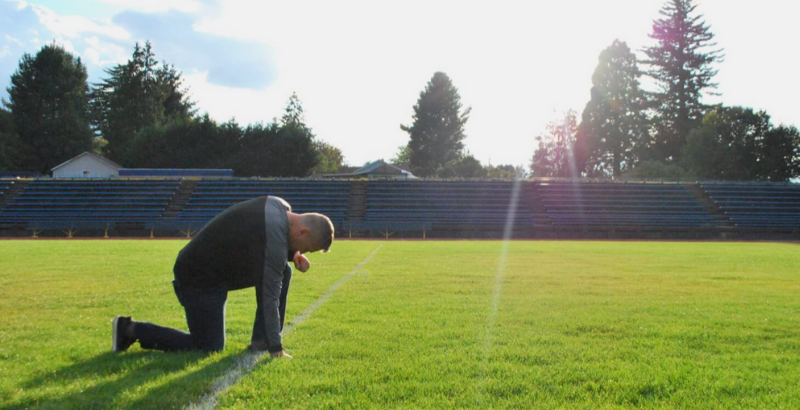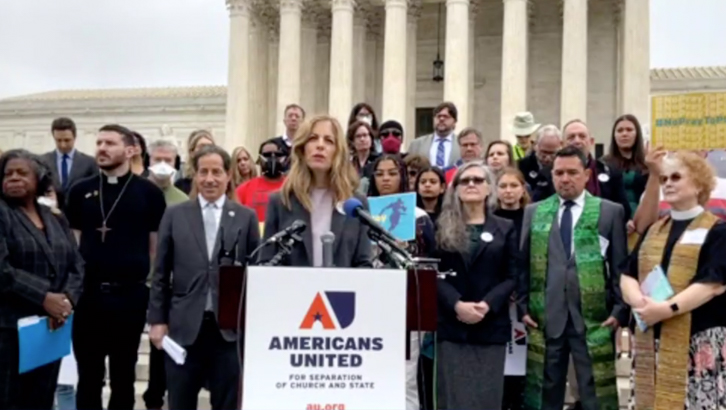Conservative Supreme Court Justices Appear to Side with Football Coach Suspended for Post-Game Prayers

Get stories like this delivered straight to your inbox. Sign up for The 74 Newsletter
Correction appended
The conservative majority on the U.S. Supreme Court on Monday appeared to be leaning in favor of a Bremerton, Washington, football coach who prayed on the field after games, despite his school district’s instructions to stop.
The case, Kennedy v. Bremerton School District, centers on whether the coach’s prayer amounted to government speech and, therefore, whether it violated the Constitution’s separation of church and state. Joseph Kennedy, the coach, argues he was unfairly put on leave for his actions.
In arguments Monday, Justice Brett Kavanaugh noted that the coach’s prayer was “not audible to all players.”
“They’re not all there,” he said. “They don’t have to be there. It’s not a team event.”
The case is the second focusing on schools and religion the court has heard this term, with a conservative supermajority on the bench leaning toward fewer restrictions on religious liberty. In December, the justices heard oral arguments in a Maine lawsuit over public funding for private religious schools.
Joshua Dunn, a political science professor at the University of Colorado, Colorado Springs, said that he doesn’t expect five justices to lean the district’s way, especially since this was a case that four of the conservative justices signaled they wanted to hear when Kennedy first petitioned the court in 2019.
John Taylor, a law professor at West Virginia University, added that it’s not just the most conservative justices on the court — Samuel Alito, Clarence Thomas and Neil Gorsuch — who see their role as “protecting conservative Christians from what they regard as oppression by the liberal, secular order.” But Brett Kavanaugh and Amy Coney Barrett “also sound the same themes on occasion.”
In Monday’s hearing, the justices posed a variety of hypothetical scenarios to both attorneys to get at the extent of a school employee’s religious freedoms under the First Amendment and what to do when exercising those rights infringe on student freedoms. Justice Brett Kavanaugh asked if an employee could make the sign of the cross, for example, and Justice Sonia Sotomayor asked if the district could fire someone who wore a Nazi swastika on their arm if they said it was part of their religion.
Richard Katskee of Americans United for Separation of Church and State, representing the district, called Kennedy’s prayers a form of coercion, adding that students worried they would lose playing time if they didn’t participate and that the coach even “announced in the press that those prayers are how he helps these kids be better people.”
Justice Elena Kagan, one of the three liberals on the court, said the district had a right to discipline the coach because even if he didn’t directly threaten to sideline players who didn’t participate, the activity puts “undue pressure” on students who have different beliefs or have no religion.
“We’re worried that the students will feel, ‘He gets to put me into a football game or not. He gets to …give me an A in math class or not,’ ” Kagan said. “This is a kind of coercion that’s improper for 16-year-olds.”
The main question in this case, Taylor said, is whether the court will try to characterize the coach’s actions as completely private or “take a broader swing at Supreme Court precedents.”

(Americans United for Separation of Church and State via @AmericansUnited)
Paul Clement, attorney for First Liberty Institute, a nonprofit law firm representing Kennedy, argued before the court that the district would have a hard time making a case for coercion because it disciplined him for two games in which students didn’t participate in prayers.
He added that the district’s argument focused on whether officials might appear to be endorsing the prayers because they occurred at a school football game. But he likened the coach’s prayers to those of soccer player Mohamed Salah and football player Tim Tebow.
“Right after Tim Tebow scores the touchdown, he’s absolutely the center of attention, yet he engages in a religious exercise,” Clement said. “It’s private, it’s permissible and the government can’t stop it.”
The justices made several references to the so-called Lemon test, which stems from Lemon v. Kurtzman, a 1971 case on church-state separation. The court in that case held that allowing religious expression is a form of endorsement, or establishment. But some of the justices noted that the standard is no longer relevant.
“I don’t think that is a test anymore,” Justice Alito said. “We haven’t applied that in two decades, and so I don’t think that helps … on the school cases.”
Note: An earlier version of this story, including the headline, incorrectly stated that Joseph Kennedy was fired by his school district for praying after football games.
Get stories like these delivered straight to your inbox. Sign up for The 74 Newsletter

;)
